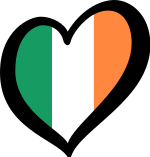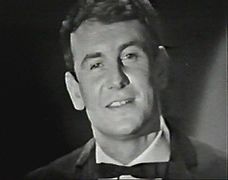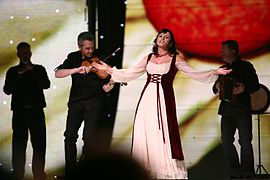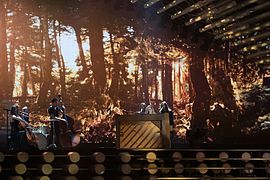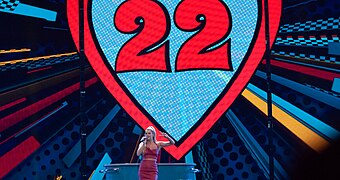Ireland at the Eurovision Song Contest
- Broadcasting company

- First participation
- 1965
- Number of participations
- 53 (as of 2019)
- Highest ranking
- 1 ( 1970 , 1980 , 1987 , 1992 , 1993 , 1994 , 1996 )
- Highest Score
- 226 (1994)
- Lowest Score
- 5 ( 2007 , 2013 )
- Points average (since first post)
- 71.21 (as of 2019)
- Average points per voting country in the 12-point system
- 2.79 (as of 2019)
This article deals with the history of Ireland as a participant in the Eurovision Song Contest ( Irish Comórtas Amhrán Eoraifíse or Comórtas Amhránaíochta na hEoraifíse ).
Regularity of participation and successes in competition
Ireland first entered the competition in 1965 and was also very successful the first few years. In its debut, the country achieved a good ranking with 6th place out of 18. In 1966 the placement was even surpassed with 4th place, before Seán Dunphy even reached 2nd place in 1967. Also in 1968 Ireland was able to secure another place in the top five with place 4. Another good placement followed in 1969 with 7th place. In 1970 Ireland's first major success followed in the competition. The singer Dana won the competition with her song All Kinds of Everything and thus got Ireland's first victory. In 1971, when the competition first took place in Ireland, the singer Angela Farrell only reached 11th place, making Ireland not among the top ten for the first time. In 1972 Ireland ended up only in 15th place out of 18, which was the worst result for the country in the competition until then. It was not until 1973 that the country was able to build on its previous successes.
In 1973, the singer Maxi reached Ireland's first place in the top ten in three years with 10th place. Ireland also achieved this ranking in 1976, while the country was 7th in 1974 and 9th in 1975. In 1977, The Swarbriggs plus Two reached 3rd place, the best ranking since 1970, and with 119 points even got a new high for the country. But Ireland was also successful in 1978 and 1979, finishing fifth in each case. In 1980, ten years after Ireland's first victory, Ireland was able to win the competition again. Johnny Logan won What's Another Year? First place and scored a new high for the country with 143 points. In 1981, when the competition took place in Ireland for the second time, the Sheeba group took fifth place, another good place for the country in the competition. All the more surprising came eleventh place in 1981, which ended Ireland's successful streak. After all, it was the worst result in nine years. In 1983 Ireland withdrew from the competition for financial reasons, but returned to the competition in 1984. From there on, the country had its most successful phase in the competition, which lasted until 2000.
In 1984 Ireland finally took second place on their return with Linda Martins Terminial 3 , which was written by Johnny Logan. 1985 and 1986 followed with 6th place and 4th place further placements within the top ten. In 1987 Ireland was very successful again, as Johnny Logan was able to win the competition again and thus brought Ireland's third victory. It was the first and so far only time in the competition that an artist could win the competition more than once. With 172 points, Logan was even able to top his own high score from 1980. In 1988, when Ireland hosted for the third time, the country finished eighth in the top ten. After all these successes, Ireland's worst place in the competition followed until then. Kiev Connolly & The Missing Passengers only took 18th place, so Ireland was all the more successful again in 1990 and took 2nd place in the competition for the third time. In 1991 another good ranking followed for the country with 10th place. In 1992 Ireland was very successful again and brought in Linda Martin and the song Why Me ?, written by Johnny Logan . the first place. It was Ireland's fourth win in the competition and the third win that Johnny Logan participated in. In 1993 Ireland hosted the Song Contest for the fourth time, while Niamh Kavanagh again won first place for Ireland with the song In Your Eyes , which was the fifth victory for the country. With 187 points she also got a new high score. Ireland also hosted the Song Contest in 1994 and again achieved first place with Paul Harrington & Charlie McGettigan and the song Rock'n'Roll Kids , which was Ireland's sixth victory and thus set two new records in the competition. Never before has a country won the competition three times in a row. To date, no country has been able to repeat this series of victories. In addition, Ireland was the country with the most victories up until then. With 226 points Paul Harrington & Charlie McGettigan even topped the new high number of points from the previous year. To date, Ireland has never again achieved such a high score in the competition, so the 226 points are Ireland's highest score to date. Ireland also hosted the competition in 1995, which Ireland set another record. No country has ever hosted three competitions in a row. However, in contrast to previous years, Ireland was not very successful in 1995, with 14th place, the worst position in six years. Participation in 1996 was all the more successful. In order to participate, however, Ireland had to go through the qualifying round of the EBU . With second place there, Ireland's participation was secured in 1996. And so Eimear Quinn took 1st place with the song The Voice in 1996 , which was Ireland's seventh win in the competition. This makes Ireland the country with the most victories to this day. Furthermore, no country has previously won the competition four times in a five-year period. So Ireland hosted the 1997 competition too, finishing in second place, making Ireland fourth second place. Ireland was also successful in 1998 and took 8th place, another place in the top ten. In 1999, however, the country only took 17th place, which was the worst ranking in ten years. In 2000, however, the country was successful again and took 6th place. From 2001, however, things then went steeply downhill for the country.
In 2001 Ireland was only in 21st place, which was Ireland's worst position in the competition to date. Due to the rules at the time, Ireland had to sit out in 2002, which is the first time since 1983 that Ireland was not represented in the final. The return in 2003 could not build on the previous successes, because Ireland just missed a place in the top ten with 11th place. In 2004 singer Chris Doran finished 22nd out of 24, which was another very poor performance for Ireland. This placement meant that Ireland had to take part in the 2005 semi-finals introduced in 2004 for the first time. However, Ireland could not qualify for the final and was eliminated for the first time in the semifinals. In the following year, Ireland first had to prove itself in the semi-finals, but was able to reach the final there with 9th place. With 10th place there, Ireland was able to build on its old successes for the first time and thus achieved the best placement for six years. It was all the worse in 2007 when Ireland did not have to compete in the semi-finals. The band Dervish ended up in last place in the final with only five points, which was Ireland's worst place in the competition until then and is still the lowest number of points Ireland has ever received. In 2008 and 2009 Ireland was eliminated in the semi-finals and continued its negative streak. It wasn't until 2010 that Ireland reached the final again.
In 2010 Ireland sent the 1993 winner Niamh Kavanagh, who took 9th place in the semi-finals and thus Ireland was represented in the final for the first time in three years. But even there the country was not very successful and only ended up in third from last place. In 2011, however, Ireland sent the twin duo Jedward, which also reached the final and took Ireland's best position in eleven years with 8th place. After this success, Jedward competed again in 2012. There they could not repeat their success and ended up in midfield in 19th place. In 2013 Ireland reached the final again, but ended up there, as in 2007, in last place with five points. Ireland's weakest phase in the competition began in 2014, so the country was eliminated in the semi-finals for the first time since 2009, as it only reached 12th place there. Also in 2015 this place was occupied in the semi-finals, so that Ireland was again not represented in the final. Ireland could not reach the final in 2016 and 2017 either. It wasn't until 2018 that the country reached the finals again, as singer Ryan O'Shaughnessy finished 6th in the semifinals. In the finals, his song Together landed in 16th place, Ireland's best result since 2011. After this small success, a new low in Irish history followed in 2019 at the Eurovision Song Contest. The singer Sarah McTernan landed with her song 22 in the last place in the semifinals and was also last in the overall result with 41 participants. This is Ireland's worst result in the competition so far.
A total of 30 of the 53 entries ended up in the left half of the table. In addition, the country has landed in last place twice so far. In addition, the country missed the final eight times. Nevertheless, with seven wins the country holds the record in the competition for the most victories, took second place four times and third place once. With many other placements within the top ten, Ireland is one of the most successful, despite the rather moderate successes since the 2000s Countries in competition.
List of posts
Color legend: - 1st place. - 2nd place. - 3rd place. - Equal points with last place. - Eliminated in the semifinals / in the qualification / in the Eastern European preliminary decision. - no participation / not qualified. - Cancellation of the Eurovision Song Contest.
| year | Interpreter | Title Music (M) and Text (T) |
language | translation | final | Semi-final / qualification |
National preliminary decision |
Charts (IRL) |
||
|---|---|---|---|---|---|---|---|---|---|---|
| space | Points | space | Points | |||||||
| 1965 | Butch Moore |
Walking the Streets in the Rain M / T: Teresa Conlon, George Prendergast, Joe Harrigan |
English | I walk the streets in the rain | 6/18 | 11 | Direct participation | National Song Contest 1965 | 1 | |
| 1966 | Dickie skirt |
Come Back to Stay M / T: Rowland Soper |
English | Come back to stay | 4/18 | 14th | National Song Contest 1966 | 1 | ||
| 1967 | Seán Dunphy |
If I Could Choose M: Michael Coffey; T: Wesley Burrowes |
English | If I had the choice | 2/17 | 22nd | National Song Contest 1967 | 2 | ||
| 1968 | Pat McGeegan |
Chance of a Lifetime M / T: John Kennedy |
English | Chance of life | 4/17 | 18th | National Song Contest 1968 | 1 | ||
| 1969 | Muriel Day |
The Wages of Love M / T: Michael Reade |
English | The reward of love | 7/16 | 10 | National Song Contest 1969 | 2 | ||
| 1970 | Dana |
All Kinds of Everything M / T: Derry Lindsay, Jackie Smith |
English | Everything imaginable | 1 /12 | 32 | National Song Contest 1970 | 1 | ||
| 1971 | Angela Farrell |
One Day Love M / T: Donald Martin, Ita Flynn |
English | One day love | 11/18 | 79 | National Song Contest 1971 | 4th | ||
| 1972 | Sandie Jones |
Ceol an ghrá M: Joe Burkett; T: Liam MacUistín |
Irish | Music of love | 15/18 | 72 | National Song Contest 1972 | 1 | ||
| 1973 | Maxi |
Do I Dream? M / T: Jack Brierlev, George F. Crosbie |
English | Am I dreaming? | 10/17 | 80 | National Song Contest 1973 | 7th | ||
| 1974 | Tina Reynolds |
Cross Your Heart M / T: Paul Lyttle |
English | Hand on heart | 7/17 | 11 | National Song Contest 1974 | 1 | ||
| 1975 | The Swarbriggs |
That's What Friends Are For M / T: Tommy Swarbrigg, Jimmy Swarbrigg |
English | That's what friends are for | 9/19 | 68 | National Song Contest 1975 | 2 | ||
| 1976 | Red Hurley |
When M / T: Brendan J. Graham |
English | If | 10/18 | 54 | National Song Contest 1976 | 4th | ||
| 1977 | The Swarbriggs plus Two |
It's Nice to Be in Love Again M / T: Tommy Swarbrigg, Jimmy Swarbrigg |
English | It's nice to be in love again | 3/18 | 119 | National Song Contest 1977 | 1 | ||
| 1978 | Colm CT Wilkinson |
Born to Sing M / T: Colm CT Wilkinson |
English | Born to sing | 5/20 | 86 | National Song Contest 1978 | 8th | ||
| 1979 | Cathal Dunne |
Happy Man M / T: Cathal Dunne |
English | Lucky man | 5/19 | 80 | National Song Contest 1979 | 3 | ||
| 1980 | Johnny Logan |
What's Another Year? M / T: Shay Healy |
English | What's another year? | 1 /19 | 143 | National Song Contest 1980 | 1 | ||
| 1981 | Sheeba |
Horoscopes M: Jim Kelly; T: Joe Burkett |
English | Horoscopes | 5/20 | 105 | National Song Contest 1981 | 3 | ||
| 1982 | The Duskeys |
Here Today, Gone Tomorrow M / T: Sally Keating |
English | Here today, away tomorrow | 11/18 | 49 | National Song Contest 1982 | 12 | ||
| 1983 | No participation | |||||||||
| 1984 | Linda Martin |
Terminal 3 M / T: Johnny Logan |
English | Terminal 3 | 2/19 | 137 | Direct participation | National Song Contest 1984 | 7th | |
| 1985 | Maria Christian |
Wait Until the Weekend Comes M / T: Brendan J. Graham |
English | Wait for the weekend | 6/19 | 91 | National Song Contest 1985 | 15th | ||
| 1986 | Windward bow |
You Can Count on Me M / T: Kevin Sheerin |
English | You can count on me | 4/20 | 96 | National Song Contest 1986 | 2 | ||
| 1987 | Johnny Logan |
Hold Me Now M / T: Johnny Logan |
English | Hold me tight now | 1 / 22nd | 172 | Eurosong 1987 | 1 | ||
| 1988 | Jump the gun |
Take Him Home M / T: Peter Eades |
English | Take him home | 8/21 | 79 | Eurosong 1988 | 3 | ||
| 1989 |
Kiev Connolly & The Missing Passengers |
The Real Me M / T: Kiev Connolly |
English | The true me | 18/22 | 21st | Eurosong 1989 | 17th | ||
| 1990 | Liam Reilly |
Somewhere in Europe M / T: Liam Reilly |
English | Somewhere in Europe | 2/22 | 132 | Eurosong 1990 | 6th | ||
| 1991 | Kim Jackson |
Could It Be That I'm in Love? M / T: Liam Reilly |
English | Could it be that I'm in love? | 10/22 | 47 | Eurosong 1991 | 7th | ||
| 1992 | Linda Martin |
Why Me? M / T: Johnny Logan |
English | Why me? | 1 /23 | 155 | Eurosong 1992 | 1 | ||
| 1993 | Niamh Kavanagh |
In Your Eyes M / T: Jimmy Walsh |
English | In your eyes | 1 / 25th | 187 | Eurosong 1993 | 1 | ||
| 1994 |
Paul Harrington & Charlie McGettigan |
Rock'n'Roll Kids M / T: Brendan J. Graham |
English | Rock'n'Roll children | 1 / 25th | 226 | Qualified directly for the final | Eurosong 1994 | 2 | |
| 1995 | Eddie Friel |
Dreamin ' M / T: Richard Abbot, Barry Woods |
English | dream | 14/23 | 44 | Eurosong 1995 | 5 | ||
| 1996 | Eimear Quinn |
The Voice M / T: Brendan J. Graham |
English | The voice | 1 /23 | 162 | 2/29 | 198 | Eurosong 1996 | 3 |
| 1997 | Marc Roberts |
Mysterious Woman M / T: John Farry |
English | Mysterious woman | 2/25 | 157 | Qualified directly for the final | Eurosong 1997 | 2 | |
| 1998 | Dawn Martin |
Is Always Over Now? M / T: Gerry Morgan |
English | Is 'forever' over now? | 9/25 | 64 | Eurosong 1998 | 24 | ||
| 1999 | The Mullans |
When You Need Me M / T: Bronagh Mullan |
English | When you need me | 17/23 | 18th | Eurosong 1999 | - | ||
| 2000 | Eamonn Toal |
Millennium of Love M: Gerry Simpson; T: Raymond J. Smyth |
English | Millennium of love | 6/24 | 92 | Eurosong 2000 | - | ||
| 2001 | Gary O'Shaughnessy |
Without Your Love M / T: Pat Sheridan |
English | Without your love | 21/23 | 6th | Eurosong 2001 | - | ||
| 2002 | Not qualified | |||||||||
| 2003 | Mickey Joe Harte |
We've Got the World Tonight M / T: Martin Brannigan, Keith Molloy |
English | Tonight we own the world | 11/23 | 53 | Qualified directly for the final | You're a Star 2003 | 1 | |
| 2004 | Chris Doran |
If My World Stopped Turning M: Bryan McFadden; T: Jonathan Shorten |
English | When my world stopped spinning | 22/24 | 7th | You're a Star 2004 | 1 | ||
| 2005 | Donna & Joe |
Love? M / T: Karl Broderick |
English | Love? | Eliminated | 14/25 | 53 | You're a Star 2005 | 2 | |
| 2006 | Brian Kennedy |
Every Song Is a Cry for Love M / T: Brian Kennedy |
English | Every song is a cry for love | 10/24 | 93 | 9/23 | 76 | The Late Late Show 2006 | 4th |
| 2007 | Dervish |
They Can't Stop the Spring M / T: John Waters, Tommy Moran |
English | You can't stop spring | 24/24 | 5 | Qualified directly for the final | The Late Late Show 2007 | - | |
| 2008 | Dustin the Turkey |
Irelande Douze Pointe M: Darren Smith, Simon Fine; T: D. Smith, S. Fine |
English, French | Ireland twelve points | Eliminated | 15/19 | 23 | Eurosong 2008 | 5 | |
| 2009 | Sinéad Mulvey & Black Daisy |
Et Cetera M / T: Niall Mooney, Jonas Gladnikoff, Daniele Moretti, Christina Schilling |
English | And so on | Eliminated | 11/19 | 52 | Eurosong 2009 | 6th | |
| 2010 | Niamh Kavanagh |
It's for You M: Niall Mooney, Mårten Eriksson, Jonas Gladnikoff; T: Lina Eriksson |
English | It's for you | 23/25 | 25th | 9/17 | 67 | Eurosong 2010 | 8th |
| 2011 | Jedward |
Lipstick M / T: Dan Priddy, Lars Jensen, Martin Larson |
English | lipstick | 8/25 | 119 | 8/19 | 68 | Eurosong 2011 | 1 |
| 2012 | Jedward |
Waterline M: Nick Jarl, Sharon Vaughn; T: Nick Jarl |
English | Waterline | 19/26 | 46 | 6/18 | 92 | Eurosong 2012 | 5 |
| 2013 | Ryan Dolan |
Only Love Survives M / T: Wez Devine, Ryan Dolan |
English | Only love survives | 26/26 | 5 | 8/16 | 54 | Eurosong 2013 | 13 |
| 2014 | Can-Linn feat. Kasey Smith |
Heartbeat M / T: Hazel Kaneswaran, Jonas Gladnikoff, Rasmus Palmgren, Patrizia Helande |
English | Heartbeat | Eliminated | 12/15 | 35 | Eurosong 2014 | 41 | |
| 2015 | Molly Sterling |
Playing with Numbers M / T: Molly Sterling, Greg French |
English | Playing with numbers | Eliminated | 12/17 | 35 | Eurosong 2015 | 77 | |
| 2016 | Nicky Byrne |
Sunlight M: Ronan Hardiman; T: Wayne Hector, Nicky Byrne |
English | sunlight | Eliminated | 15/18 | 46 | internal selection | 68 | |
| 2017 | Brendan Murray |
Dying to Try M / T: Jörgen Elofsson |
English | Burning to try | Eliminated | 13/18 | 86 | internal selection | - | |
| 2018 | Ryan O'Shaughnessy |
Together M / T: Ryan O'Shaughnessy, Mark Caplice, Laura Elizabeth Hughes |
English | Together | 16/26 | 136 | 6/19 | 179 | internal selection | 17th |
| 2019 | Sarah McTernan |
22 M / T: Janieck van de Polder, Marcia Sondeijker, Roel Rats |
English | - | Eliminated | 18/18 | 16 | internal selection | - | |
|
|
Lesley Roy |
Story of My Life M / T: Lesley Roy , Robert Marvin, Catt Gravitt, Tom Shapiro |
English | story of my life |
Cancellation due to the COVID-19 pandemic by the EBU |
internal selection | ||||
| 2021 | ||||||||||
National preliminary decisions
- Main article: Irish qualifications for the Eurovision Song Contest
Until 2015, all Irish representatives were elected in a national preliminary decision. From 1965 to 1986, with the exception of 1983 when Ireland did not participate, the National Song Contest was held every year . From 1987 to 2001 the Eurosong was used to determine the Irish representative. From 2003 to 2005, the casting show You're a Star was used to determine the Irish representative. In 2006 and 2007 the representatives were selected internally and each presented a few titles on the Late Late Show . From 2008 to 2015 the Eurosong took place again. Since 2016, the Irish broadcaster has been selecting its representatives and their songs internally.
languages
Most of the Irish contributions were presented entirely in English. Ceol an ghrá , the contribution to the Eurovision Song Contest 1972 , was sung in Irish (Gaelic). In 2008, most of the Irish contribution was made in English, but included words from several other European languages.
In the case of competitions organized in Ireland, a few words were always said in Irish during the moderation - usually as a greeting - and occasionally when the country points were transmitted.
Commercial success
National
Many Irish contributions became a hit in Ireland: a total of 13 songs reached first place in the charts, 20 more reached the top 10. By 1999 all contributions reached the singles charts, by 1982 they all landed in the top 10. The first five Irish winning titles were Number one hits (including the most successful single of the year in 1993; Rock'n'Roll Kids and The Voice were a little less successful with second and third place). From 1999 onwards, the commercial success decreased significantly; only since 2003, when the Irish representative in the casting show You're a Star was determined, hits could be achieved again. The group Dervish could not place themselves in the charts with They Can't Stop the Spring 2007, their song was also not released as a single, but only as a free online download.
International
Both Dana with All Kinds of Everything and Johnny Logan with his two winning titles were very successful across Europe, the singles are almost everywhere in the charts and in some countries also at number one. The later four winners were far less commercially successful and only hit the charts in very few countries.
Competitions held
Ireland hosted the competition after each win, a total of seven times, making it the second most common host after Great Britain . In six cases, the event took place in Dublin , making the city the most frequent venue in the history of the competition; In 1993 the rather unknown village of Millstreet was chosen, which is still the smallest venue of all time with 1,500 inhabitants.
Scoring
The following countries received the most points from or awarded the most points to Ireland (as of 2019):
|
|
|
|
||||||||||||||||||||||||||||||||||||||||||||||||||||||||||||||||||||||||||||||||||||
Award of the highest rating
Since 1975 Ireland has given the maximum number of points to 23 different countries, including Sweden six times. In the semi-finals, on the other hand, Ireland gave the maximum number of points to eleven different countries, including seven times to Lithuania.
|
|
|||||||||||||||||||||||||||||||||||||||||||||||||||||||||||||||||||||||||||||||||||||||||||||||||||||||||||||||||||||||||||||||||||||||||||||||||||||||||||||||||||||||||||||||||||||||||||||||||||||||||||||||||||||||||
various
- At the 1994 Song Contest in Dublin, the dance formation Riverdance appeared as a pause number before scoring. This first appearance in front of a large audience was the starting signal for the subsequent worldwide success of Riverdance.
- In 1999 Ireland took the lead after the first scoring - twelve points from Lithuania - but ended up only in 17th place with a total of 18 points.
- Brian Kennedy's song Every Song Is a Cry for Love (ESC Athens 2006) was the 1,000th. Contribution to the history of the Eurovision Song Contest.
- Kennedy himself had already worked as a singer on the break number in 1995, when the competition was broadcast from Dublin.
- In 2007 Ireland came last with 5 points for the first time. This was repeated in 2013.
- In 2008 Ireland was represented by a doll , Dustin the Turkey . It was the first time that a doll represented a country in the Eurovision Song Contest .
- Ireland was the first country to win the ESC with over 200 points.
Impressions
Individual evidence
- ↑ irishcharts.ie
- ↑ a b keithm.utvinternet.ie ( Memento of the original from August 18, 2007 in the Internet Archive ) Info: The archive link was inserted automatically and has not yet been checked. Please check the original and archive link according to the instructions and then remove this notice.
